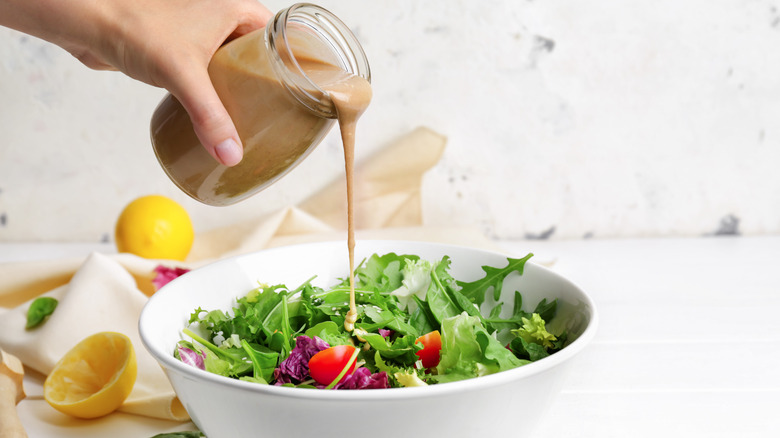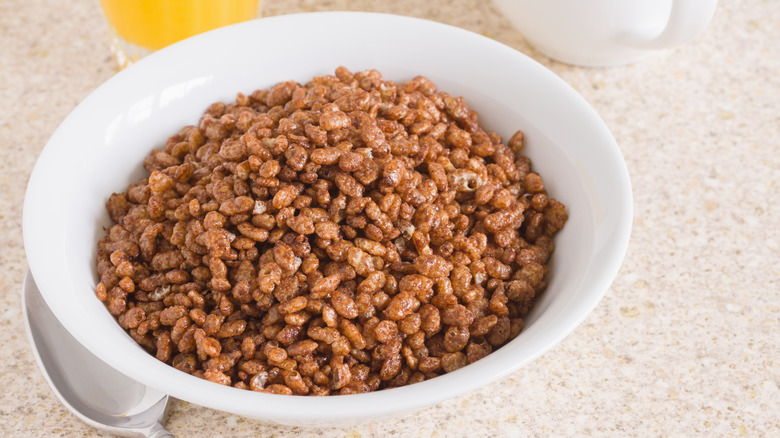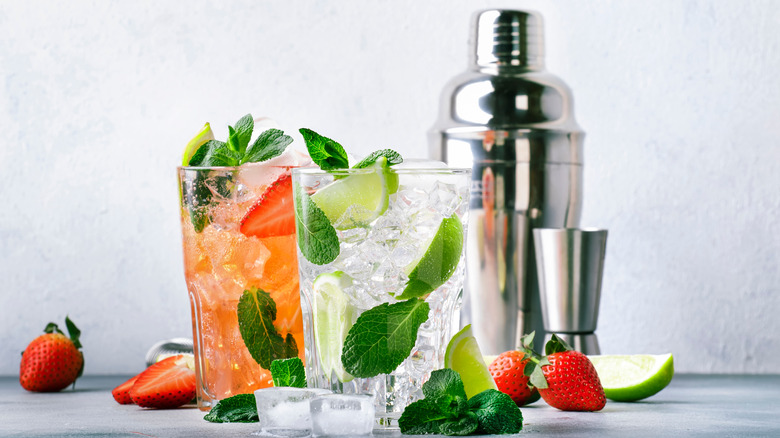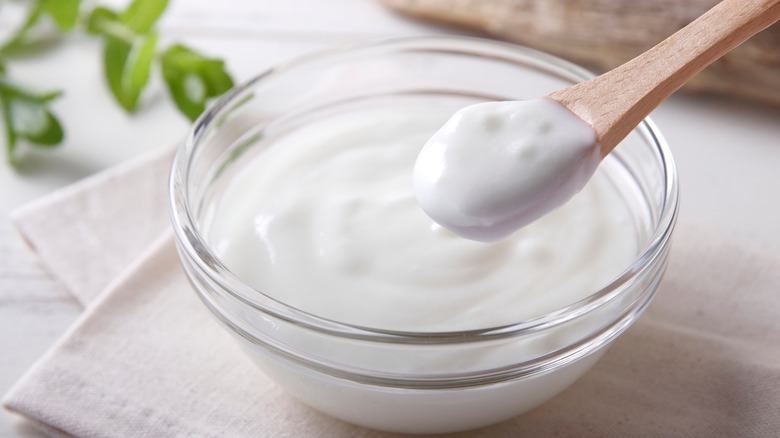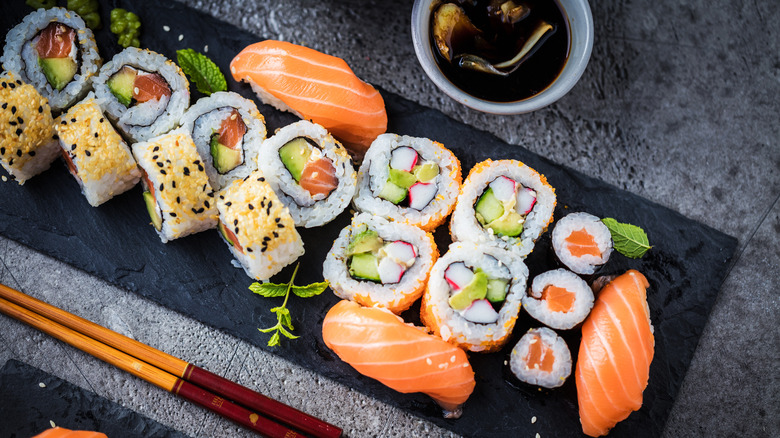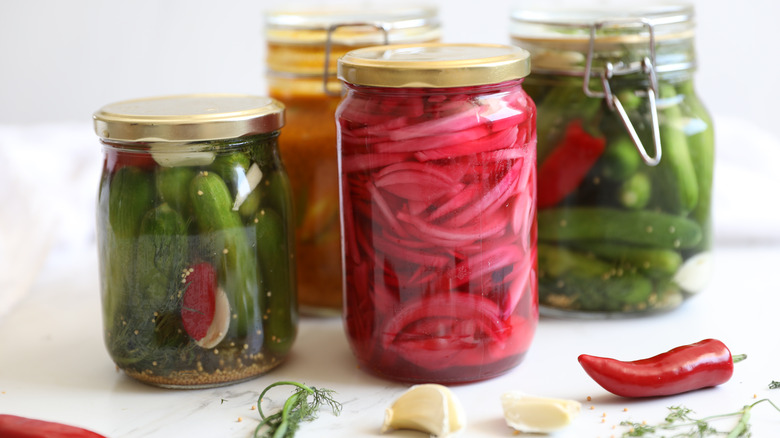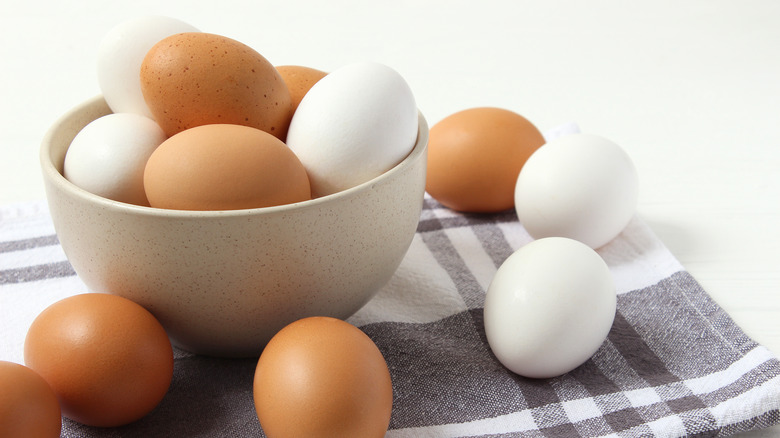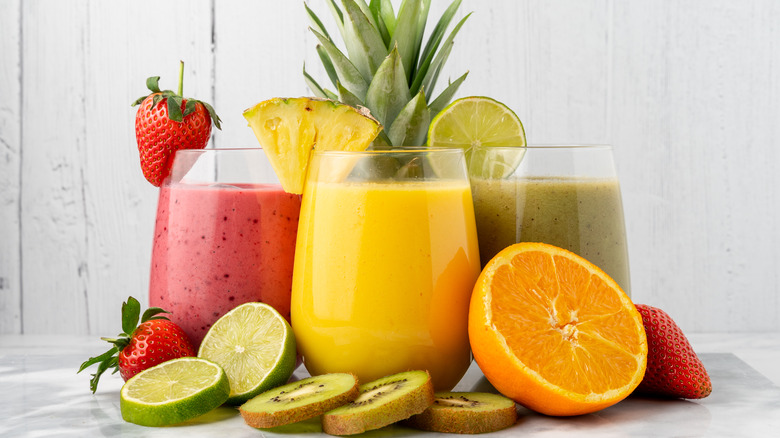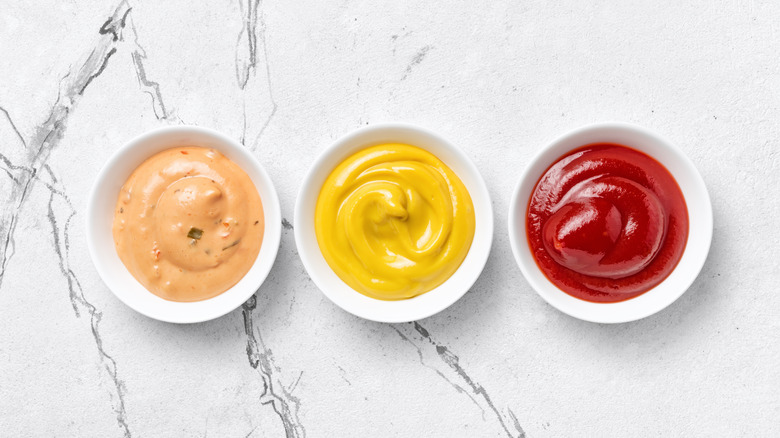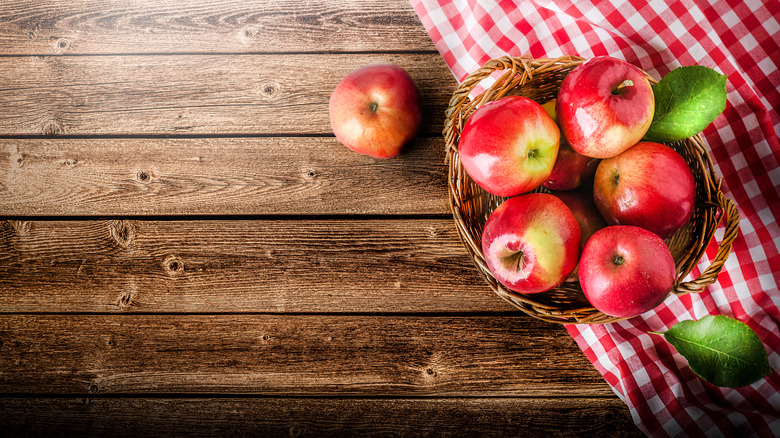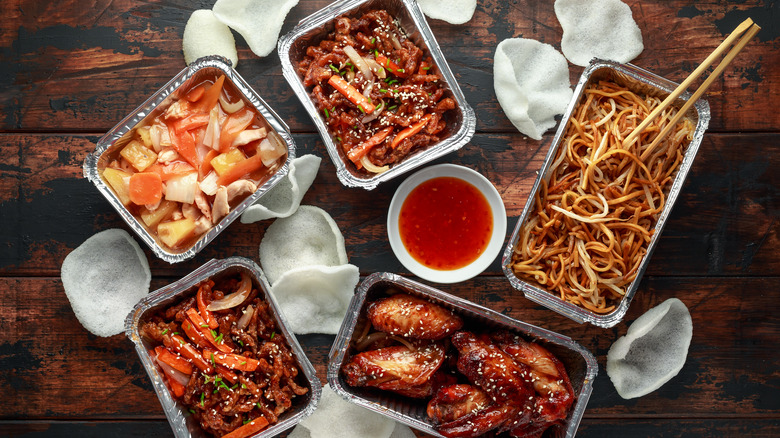Foods That Are Actually Making You Hungrier
Have you ever wondered why you get hungry? While the obvious answer to this might be "because I haven't eaten enough, duh," it's actually a little more complicated than one might think.
"Hunger is a result of many complex interactions that occur in the stomach, intestines, brain, pancreas, and bloodstream," weight-loss specialist and board-certified internist Dr. Sue Decotiis told Health. There are also different types of hunger: "homeostatic hunger,'" which occurs when our bodies need to balance energy levels in the short term, and "hedonic hunger," which arises when we have the chance to gather additional energy for long-term use (per Medical News Today).
Plus, hunger levels can not only be affected by factors like how much we're sleeping and how much water we're drinking but also by our many dietary choices, as Healthline stated. So if you're wondering why you're almost always feeling a bit peckish, the answer might lie in your diet itself. And as it happens, there are a surprising number of foods out there that might actually be making you eat more. Let's take a look at some of these culprits.
Fat-free salad dressings might leave you wanting more
Beloved of those trying to keep their fat intake down, fat-free dressings might cause you to get "hangry." "When we grab for the fat-free bottle, we think we are making a good choice," Lisa Hayim, registered dietitian told Eat This, Not That. However, she explained that "fat-free salad dressings can be loaded with salt and sugar to give them flavor." Hayim continued, saying, "We end up pouring on more, making sure each piece of lettuce in our salad is doused. After the salad is over, the salt and sugar make you feel unsatisfied and craving more."
Hayim's assertion that high levels of both salt and sugar can increase hunger levels in a diet has been found in studies. One 2017 study published in The Journal of Clinical Investigation, for instance, found that increased salt levels in a diet can lead to increased cravings to eat more, particularly in the long term. Eating higher levels of sugar (particularly fructose) can also spike your hunger by affecting insulin levels, as well as raising appetite-increasing hormone levels and lowering levels of hormones that reduce hunger, as a study from Frontiers in Nutrition shows. To stay satisfied, keep a little fat in there.
Granola bars can boost hunger in surprising ways
Granola bars are often marketed as healthy snacks, but many are loaded with added sugar. Some choices contain as much as 4 teaspoons of sugar per bar, as Healthline states. That's nearly the same amount as three Oreos.
These sugar levels can wreak havoc on your hunger pangs. "Sweet foods end up making you feel hungrier for more time, unless they are properly paired with protein, fat or fiber," Robyn Youkilis, health coach and author of "Go With Your Gut" and "Thin From Within," told Bustle. "Why is this? Well your body burns through the sugars quickly — you get a little boost of energy but then it needs more to keep on going. This is why you may feel great one hour after eating that granola bar, but ravenous 90 minutes later."
However, granola bars have the advantage of generally being made with oats, which provide a boost of heart-healthy beta-glucan fiber. According to a review of studies published in the Journal of the American College of Nutrition, beta-glucan fiber can help to reduce levels of hunger and keep you fuller for longer. Just make sure that those oats aren't doused in sugar.
Your bowl of breakfast cereal could leave you unsatisfied
While breakfast cereals can be a quick and easy way to start your day, carb-heavy and sugary cereals can often leave you ravenous by lunchtime. This isn't only due to its composition as a food, but also the time that you generally eat it. According to weight-loss specialist and board-certified internist Dr. Sue Decotiis, "Eating such a high carbohydrate load in the morning when cortisol levels are at their highest is a double assault to your metabolism" (via Health). Cortisol, a key hormone that regulates our metabolisms, controls salt, water, and inflammation levels, tends to be high in the early hours of the morning, according to the Society for Endocrinology.
Unfortunately, according to Decotiis, "Higher cortisol levels mean a lower ability to metabolize ingested sugars. Therefore blood sugar may be high, but still not reach the tissues where it is needed, leading to fatigue and hunger." And with certain brands of breakfast cereals delivering 4 teaspoons of sugar per serving, these ingested sugars can be very high in one go. Instead, opt for a high-protein, high-fiber cereal like muesli to keep yourself satisfied for hours (via Healthline).
Alcohol can have you quickly wanting to eat more
Anyone who's found themselves constructing a sandwich from literally anything in the fridge after a night out (no? Just us?) will be familiar with how alcohol can affect hunger levels. What's interesting, though, is exactly how alcohol encourages us reach for the snacks. "Alcohol can lower a person's levels of leptin, which is responsible for helping to keep us full," Amy Strutzel, a diabetes dietitian educator at Advocate Condell Medical Center in Libertyville, Illinois, told AHC Health eNews. "Alcohol also can lower our glycogen stores, so we often crave carbs to replace what is lost. Alcohol lowers our inhibitions as well, which can cause people to choose fattier, less healthy foods."
And if the effects on hunger aren't clear enough during or immediately after a couple of drinks, they can carry on to the next day as well. If you've ever wondered why you get hungrier during a hangover, it's because "drinking can decrease your blood sugar levels temporarily, and overnight, after drinking, your body tries to compensate and readjust your blood glucose levels. As a result, you feel hunger pangs," said women's health expert Dr. Jennifer Wider to Self.
Having a yogurt? Make sure to mix in some extras
It might surprise you to see yogurt on this list, what with its good-for-you reputation. However, certain types of yogurt can actually be pretty unsatisfying for hunger levels. "While yogurt is constantly promoted as a super healthy food, it truly depends on which one you choose to keep you full," registered dietitian Kayleen St. John confirmed to Eat This, Not That. According to St. John, the combo of low fat and high sugar in some yogurts can leave you feeling hungry pretty soon after eating.
What's more, yogurt doesn't require chewing, so it can actually feel much less satisfying to eat, leading to a renewed appetite. "The act of chewing helps to increase our fullness factor," said Amy Strutzel, a diabetes dietitian educator at Advocate Condell Medical Center in Libertyville, Illinois, to AHC Health eNews. As such, it can help to give your yogurts a little more bulk, says Strutzel. "Adding something such as nuts can increase chewing. And including nuts can also add some healthy, unsaturated fats, which may help us feel fuller longer."
If you don't want to be hungry by mid-morning, avoid fruit juice for breakfast
A glass of fruit juice might be a picture-perfect start to your morning, but it's unlikely to keep you satiated for long — particularly when substituting a piece of whole fruit for its juice. "Fruit juice is all of the sugar in fruit without any of the beneficial fiber," California-based registered dietitian and nutritionist Adalise Jacob told Bustle. "When you eat a whole apple, its fiber helps slow down the absorption of its fructose by your bloodstream. When you take the fiber out and make apple juice, you are essentially drinking liquid sugar that will make your blood sugar spike, then slump." When your blood sugar dips, your body seeks to elevate it again, leading to hunger (via Medical News Today).
In fact, many ways of processing fruit can leave them less satisfying than when they were whole. According to a study published in Appetite, applesauce and apple juice were found to be less satiating compared to a whole apple.
Diet soda can cause you to eat more
While diet soda may be loved by those trying to keep calorie intake down, it may actually lead to you eating more. This is due to the inclusion of sucralose, a zero-calorie sweetener typically used in place of sugar to keep these drinks tasting sweet, according to Healthline. Artificial sweeteners like sucralose have long been used by people seeking to reduce calorie intake for dietary or other reasons. According to a 2014 analysis of randomized controlled trials published in The American Journal of Clinical Nutrition, using low-calorie sweeteners in place of sugar can result in a "modest weight loss" of around 1.7 pounds on average.
However, a more recent study published in Cell Metabolism observed a link between the consumption of sucralose and increased hunger levels, particularly if consuming it regularly. The study's authors wrote, "Our data show that chronic consumption of a sweet/energy imbalanced diet triggers a conserved neuronal fasting response and increases the motivation to eat."
Sushi is not quite as satisfying as it seems
Sushi is pretty much the picture of a healthy, nutritious lunch or dinner, but some types of sushi can actually leave you feeling ravenous. According to registered dietitian Susan M. Kleiner, a scientific consultant with USANA Health Sciences, while we think that sushi's primarily made up of satisfying, healthy fish, what we're actually consuming, particularly with sushi rolls, is a large amount of white rice. White rice scores high on the GI index, being digested quickly and causing a spike in blood sugar levels, as Harvard Health Publishing shows.
As a result, Kleiner told Health, "If you don't eat anything else, sushi rolls are fairly rapidly digested and emptied from the stomach without a high level of satiating properties like fiber or protein." Some types of sushi rolls, like the California roll, can contain 30 grams of carbohydrates per serving, which will wreak havoc on your blood sugar if eating it and it alone. If you're planning to order sushi, try to opt for choices that have a higher proportion of vegetables or fish to rice. Or, cut out the rice middleman and opt for sashimi, as Men's Journal suggests.
Pickles may make you snack more
If you're a big fan of pickles — whether pickled cucumbers or any pickled food — you might not be a fan of what they can do to your appetite. With foods like pickles, kimchi, and sauerkraut generally being high in sodium, they can leave you feeling pretty thirsty, and if you're not covering your bases by consuming more water it can lead to dehydration (via Cooking Light).
Unfortunately, mild dehydration and hunger symptoms are pretty similar. "Mild dehydration is often masked as feelings of hunger, when really your body just needs fluids," registered dietitian Alissa Rumsey, spokesperson for the American Academy of Nutrition and Dietetics, confirmed to Health. Both appetite and thirst and regulated by the hypothalamus, and when dehydration occurs, this can lead to hunger pangs.
The solution, luckily, is simple: Drink more water. As Rumsey said, "Prevent it by staying on top of your fluid intake, starting with a glass of water first thing in the morning. If you feel hungry, and you haven't drunk much that day, try drinking a glass of water and waiting 15 to 20 minutes to see if your hunger subsides."
Egg whites might not be the calorie-saving food you think they are
The best friend of bodybuilders and meringue-makers alike, egg whites are praised for their ability to deliver protein without any fat. While this may have its positives, removing the yolk may not keep you full for very long. "The yolk contains healthy nutrients, like eye-healthy lutein, along with some protein and healthy fat that will make your egg dish much more substantial," registered dietitian Isabel Smith told Women's Health.
The increased fats and proteins, and therefore the increased calories, that come in the egg yolk will keep you going for much longer than just eating the whites will. It's worth remembering that while an egg white is a source of protein, one from a large egg contains just 17 calories, with the yolk of the same egg supplying around 55 (per Healthline). Fewer calories mean less energy, and less energy will naturally lead to more hunger. With whole eggs proving to be one of the best foods out there for weight loss and hunger control, don't skimp on the yolk.
Smoothies are a tasty treat, but they're not so great for your appetite
Smoothies might be a favorite of the health brigade, but they may not work wonders for your appetite and can lead to more food consumption throughout the day. The first reason starts in the mouth. "Sometimes people who drink their foods don't have the same satiety feeling as with chewing a solid food," registered dietitian nutritionist Beth Warren, founder of Beth Warren Nutrition and author of "Living a Real Life With Real Food" told Self.
Smoothies can also often unintentionally strip away or omit vital elements that lead to satiety, like fiber and protein. According to registered dietitian Jessica Cording, "When you make a smoothie, you retain a lot of the fiber but your body doesn't have to work as hard to digest it," and a lack of protein in smoothies means that "it's just going to break down quickly and you're going to be hungry again not long after drinking it." While smoothies can often contain more fiber than fruit juice, whole fruit or veg is always a better choice.
Ketchup and condiments can add to hunger
Beware of the red blob on the side of your plate as it could be having more of an effect on your hunger than you think. A dab of ketchup, alongside other condiments, can cause you to get hungry again faster. "Ketchup, or any food made with high fructose corn syrup (HFCS), can make your appetite continue to grow stronger," revealed Lisa Hayim, registered dietitian and founder of The Well Necessities, to Eat This, Not That. "HFCS interrupts the body's metabolism and slows down the production of leptin (which helps us feel full). As a result, there is no message being sent to the body that you're full and that it's time to stop eating."
And when it comes to foods that contain HFCS, ketchup is just the tip of the iceberg. While less-healthy options that you might expect like candy, boxed dinners, and ice cream can often include HCFS, it can also be present in more surprising, seemingly "healthier" food sources like salad dressing, yogurt, and canned fruit, according to Healthline. As such, always keep an eye on what's in your food before buying if you're trying to avoid this tricky ingredient.
Apples can be a surprising source of hunger
Wait ... what? Apples, the signifier of all that is good and healthy, can make you hungrier? According to registered dietitian Justine Roth, this is indeed the case. "Apples are of course good for us to eat but they are still a simple sugar and cause a glucose spike, insulin release, and a quick drop as it gets digested quickly. This is a good thing for your body but not so much for your hunger levels," Roth told Bustle.
The solution, Roth says, is to try and combine apples with protein or fat to keep your appetite at bay. "I always recommend adding peanut/almond butter or another source of protein, like [cheese.] This will help slow down the glucose spike, less insulin will be released to break down the sugar, and you will digest it slower, thus keeping you fuller longer."
Some fruits, like not-quite-ripe bananas, can be a better option for those seeking fruit that keeps you full. "Rich in fiber, slightly green bananas contain a source of resistant starch which is slower digested, promoting fullness," Erin Palinski-Wade, registered dietitian and author of "Belly Fat Diet for Dummies," told The Healthy.
Chinese takeout (or anything with MSG) may boost hunger pangs
"Chinese food is often loaded with MSG. Monosodium glutamate is used as a flavor enhancer and is found in other types of food such as soups, processed meats, and more," Lisa Hayim, registered dietitian and founder of The Well Necessities, confirmed in an interview with Eat This, Not That. "Some research suggests that the chemicals in MSG cause a drastic increase in appetite, which seems appropriate as people who consume the most amounts of MSG are more likely to be overweight compared to those that have no MSG in their diet."
Indeed, a study published in Physiology and Behavior found that participants who ate food containing MSG in the first course of a restaurant meal showed a stronger motivation to eat again sooner, as opposed to those who didn't consume it. It's also worth remembering that while Chinese takeout is often considered to be the main culprit when it comes to MSG, it's also present in many seasonings, dressings, condiments, and snacks, according to WebMD.


